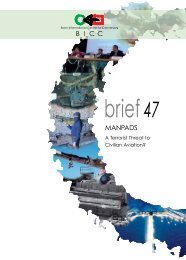egypt-final-presidential-elections-2012
egypt-final-presidential-elections-2012
egypt-final-presidential-elections-2012
You also want an ePaper? Increase the reach of your titles
YUMPU automatically turns print PDFs into web optimized ePapers that Google loves.
The Carter Center<br />
Presidential Election in Egypt<br />
context of a compulsory voting system, the importance<br />
of such systems is heightened and demands<br />
the highest standards of accuracy, transparency,<br />
and public confidence. As such, The Carter<br />
Center offers the following recommendations:<br />
• Exhibit a provisional voters’ list at the community<br />
level to allow for voters to scrutinize and<br />
challenge the lists as necessary, ensuring the<br />
maximum possible protection of the right of<br />
universal suffrage, a fundamental national and<br />
international obligation.<br />
• Take proactive steps to ensure the full enfranchisement<br />
of eligible citizens, such as those who<br />
are not currently in the national identity database<br />
(especially including the disproportionate<br />
number of women), citizens who turn 18 years of<br />
age after the closing of the voters’ list and before<br />
election day, citizens who have been disenfranchised<br />
due to a declaration of bankruptcy, and<br />
recently naturalized citizens. A supplementary<br />
registration process might be a useful means<br />
to ensure the full enfranchisement of Egypt’s<br />
citizens who may not be in the national identity<br />
database or in possession of the national identity<br />
card.<br />
• Finalize the voters’ list well in advance of election<br />
day, which will help address any concerns<br />
or problems caused by the late dissemination of<br />
supplementary lists.<br />
• Carry out voter education about registration<br />
processes to inform the public of their opportunity<br />
to participate in the process.<br />
While it is not an explicit obligation in international<br />
law, releasing copies of the voters’<br />
lists to candidates and parties is a widely used<br />
international best practice that promotes greater<br />
confidence in the voter registration process. In<br />
addition, The Carter Center recommends that<br />
the <strong>final</strong> voters’ lists should be subject to public<br />
review as a means of ensuring transparency in the<br />
election process and allaying concerns about the<br />
accuracy of the list.<br />
10. Ensure that election officials and key stakeholders<br />
are adequately trained to consistently implement<br />
all aspects of electoral law and procedure.<br />
The Carter Center witnesses noted some election<br />
day procedures that were inconsistently applied<br />
during both rounds of the <strong>presidential</strong> election.<br />
The Center recommends that EMB officials<br />
develop effective methods to ensure that training<br />
is comprehensive, inclusive, and efficient for<br />
officials at all levels of election administration,<br />
consistent with international good practice. To<br />
help ensure consistency of practice, it is essential<br />
that election officials and other key stakeholders<br />
be adequately trained on all aspects of a clear<br />
and comprehensive set of electoral laws and<br />
regulations. Clear procedures should include the<br />
following issues, where Carter Center witnesses<br />
noted inconsistencies during the <strong>elections</strong>:<br />
Assistance to illiterate voters: Carter Center<br />
witnesses reported inconsistencies regarding<br />
whether assistance was provided to illiterate voters<br />
and in the degree of assistance that was provided.<br />
Given Egypt’s high illiteracy rate, The Carter<br />
Center recommends that Egyptian legislators<br />
enact legal provisions authorizing the assistance<br />
of illiterate voters by election officials that are<br />
similar to legal provisions governing the assistance<br />
of disabled or visually impaired voters. Election<br />
officials should ensure that all election personnel<br />
and other stakeholders are trained on how to<br />
correctly assist illiterate voters who may require<br />
assistance.<br />
Inking of fingers: Carter Center witnesses noted<br />
multiple instances where voters’ fingers were<br />
not checked for ink before voting. If inking is to<br />
remain a part of the voting process, EMB officials<br />
should ensure that all election officials and other<br />
stakeholders are well-trained on the existing law<br />
regarding the proper inking of fingers, including<br />
for voters who wear gloves.<br />
Poll opening: Carter Center witnesses observed<br />
that in many instances polling stations did not<br />
open until after the legally mandated starting time<br />
70



